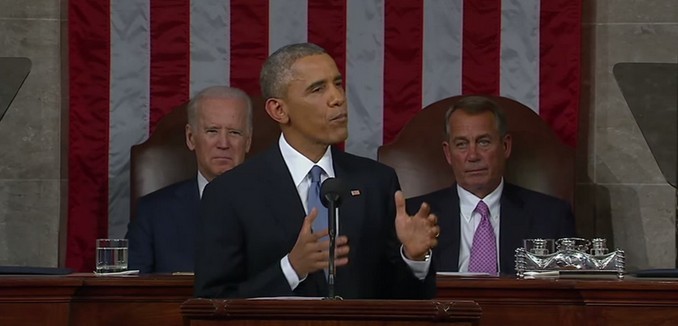President Barack Obama made a number of inaccurate claims about the ongoing nuclear negotiations with Iran in an interview with Reuters yesterday.
In the course of the interview the President charged that Israeli Prime Minister Benjamin Netanyahu was wrong in his assessment of Iran’s behavior since the P5+1 agreed to the Joint Plan of Action (JPOA) with Iran in November 2013.
Netanyahu made all sorts of claims. This was going to be a terrible deal. … Iran would not abide by the agreement. None of that has come true.
Iran in fact did not abide by the JPOA. According to the JPOA Iran agreed not to “make any further advances” at its uranium enrichment plants. But the International Atomic Energy Agency (IAEA) reported in November of last year that Iran had fed uranium hexafluoride gas into an IR-5 model centrifuge. The IR-5 is an advanced model that had not yet been utilized by Iran making this a violation of its commitment not to make advances in enrichment. According to a report (.pdf) by the Institute for Science and International Security at the time, “a few days later the United States had brought up the matter with Iran and Iran pledged to stop feeding this centrifuge.”
In addition to freezing centrifuge development, the JPOA sought to limit the amount of oil exported by Iran. However, over the first six months that the JPOA was in force, Iran exported more oil than it was allowed by the terms of the deal.
In general the JPOA (.pdf) required Iran to account for its past nuclear research:
A Joint Commission of E3/EU+3 and Iran will be established to monitor the implementation of the near-term measures and address issues that may arise, with the IAEA responsible for verification of nuclear-related measures. The Joint Commission will work with the IAEA to facilitate resolution of past and present issues of concern.
Yesterday a report from the IAEA stated that because Iran had not met its commitments to reporting on its past nuclear work, “the Agency is not in a position to provide credible assurance about the absence of undeclared nuclear material and activities in Iran, and therefore to conclude that all nuclear material in Iran is in peaceful activities.” Among the aspects of Iran’s past work that it has not accounted for, Iran has refused IAEA inspectors access to the Parchin military base where Iran is believed to have experimented with exploding bridge wires (EBW). One of the applications of EBW is to detonate a nuclear device.
With Iran possessing an “undeclared” nuclear program of unknown size, verification of the declared program is insufficient to prevent Iran from secretly developing a nuclear weapon.
In his interview President Obama also claimed:
It has turned out that, in fact, during this period we’ve seen Iran not advance its program. In many ways, it’s rolled back elements of its program.
This is similar to the claim Obama made during his State of the Union address that “our diplomacy is at work with respect to Iran, where, for the first time in a decade, we’ve halted the progress of its nuclear program and reduced its stockpile of nuclear material.”
The Washington Post’s fact-checker gave that claim “three Pinocchios,” writing that actually during the the course of the JPOA “the amount of nuclear material that eventually could be converted to a bomb during a ‘break out’ period has continued to increase.” In addition, Iran’s enrichment program and construction of its heavy-water reactor have continued apace.
In his interview, President Obama also dismissed the significance of sanctions in bringing Iran to the bargaining table. He actually asserted that the effect of sanctions has been counterproductive.
And we know that because during the period in which we applied sanctions for over a decade, Iran went from about 300 or a couple of hundred centrifuges to tens of thousands of centrifuges in response to sanctions.
Oddly, this is the same claim made by Iranian officials. Iran’s foreign minister and chief nuclear negotiator, Mohammad Javad Zarif, said in an interview last year:
For the past eight years, there have been sanctions imposed on Iran—by the United Nations with the pressure of the United States, and by the United States. The net result of all these sanctions is that when the sanctions started to be imposed, we had less than two hundred centrifuges. Today, we have twenty thousand. So if people start calculating, they’ll see that sanctions have produced all these centrifuges.
Zarif claims that Iran had fewer than two hundred centrifuges when sanctions started, but that is not true. Former nuclear negotiator and current president of Iran, Hassan Rouhani, said in an interview during his campaign two years ago:
“We halted the nuclear program? We were the ones to complete it! We completed the technology. …Do you know when we developed yellowcake? Winter 2004. Do you know when the number of centrifuges reached 3,000? Winter 2004.”
According to Rouhani the biggest leap in the number of centrifuges occurred before sanctions were imposed. Unlike Zarif, who was arguing against painful sanctions, Rouhani had little reason to lie.
In his attempt to rebut Netanyahu’s speech later this morning the President appears to have been careless in marshaling his arguments.
[Photo: Washington Post / YouTube ]




